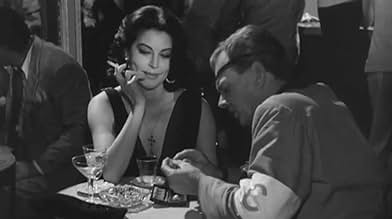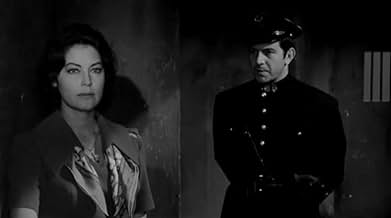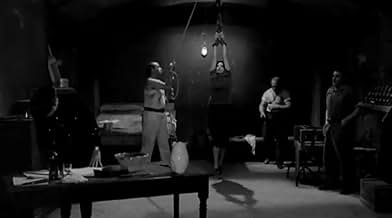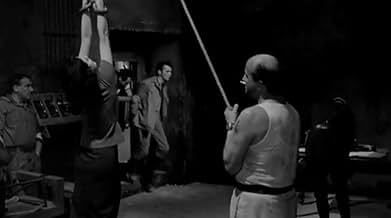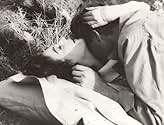Father Arturo Carrera leaves the priesthood over the church's indifferent position during the Spanish Civil War, but finds himself attracted to beautiful entertainer Soledad.Father Arturo Carrera leaves the priesthood over the church's indifferent position during the Spanish Civil War, but finds himself attracted to beautiful entertainer Soledad.Father Arturo Carrera leaves the priesthood over the church's indifferent position during the Spanish Civil War, but finds himself attracted to beautiful entertainer Soledad.
- Director
- Writers
- Stars
Robert Bright
- Father Idelfonso
- (uncredited)
Franco Castellani
- José
- (uncredited)
Nino Castelnuovo
- Capt. Trinidad
- (uncredited)
Robert Cunningham
- Mac
- (uncredited)
Gustavo De Nardo
- Maj. Garcia
- (uncredited)
Franco Fantasia
- Cabaret Customer
- (uncredited)
Armando Fracassi
- Nationalist Prisoner
- (uncredited)
- Director
- Writers
- All cast & crew
- Production, box office & more at IMDbPro
Featured reviews
A fairly potent script with an interesting plot device at its core (both believers and non-believers alike chase after a sacred religious relic during a bloody civil war), undermined by rather bland, pedestrian film-making. Thus, it's not terribly surprising this was the last film directed by the prolific screenwriter Nunnally Johnson. He shoots just about everything in an overly dark and cramped way making it often impossible to determine where a scene is set, let alone what is going on or even who is in it. This may have been intentional, with the absence of light meant to convey the spiritual darkness in which the country of Spain was submerged at the time, but it comes off as crude and makes for rough viewing. There's something strange about the sound as well; there are few if any sufficiently lit close ups and it seems as if some of the actors' voices have been dubbed. Vittorio DeSica's character, for instance, comes across a bit like Truman Capote playing General Patton. Joseph Cotten pops up every now and again, as a cynical, gravel-voiced newsman, (in fact, he also narrates) but you never ever really see his face and there is something disembodied about his entire presence. It's all a bit unsettling.
Nonetheless, if you can endure its flaws, the movie raises some thought provoking questions on the nature of faith and religion in times of strife, and Dirk Bogarde is quite impassioned as the troubled priest. Ava Gardner, however, is noticeably past her prime as Bogarde's love interest, and her character isn't adequately fleshed out.
Nonetheless, if you can endure its flaws, the movie raises some thought provoking questions on the nature of faith and religion in times of strife, and Dirk Bogarde is quite impassioned as the troubled priest. Ava Gardner, however, is noticeably past her prime as Bogarde's love interest, and her character isn't adequately fleshed out.
The Angel Wore Red is one of the few films in the English speaking world that
deals with the Spanish Civil War. It takes an even handed approach to the
conflict as well.
The military high command in the Spanish Republic withdrew its support from the civil government that came into power after the Spanish monarchy was overthrown in 1931. The Nationalist had disciplined troops and the backing of the Catholic Church. The Republican government cobbled together an army and it fought as best it could from 1936 to 1939.
Dirk Bogarde decides to leave the church at the worst possible time when the city he was posted to is under siege. Those left wing folks occupying the city were very anti-Catholic and they were rounding up priests as spies for the Nationalists. When the Nationalists take the city he's got a problem with them in that they don't quite buy him either. The only one who seems to get him is Ava Gardner playing a bar entertainer who gets by the best she can. When you've been celibate you can imagine how intense it must have been.
There's also a religious relic that the church has, a drop of blood from St.John the Divine. Both sides want to possess it.
This tale is told from neutral correspondent Joseph Cotten who with his eye patch is modeled on Floyd Gibbons. He's quite cynical about the war and is not believing all the fuss about this religious relic. But the phenomenon is there for him to report.
According to Lee Server's biography of Ava Gardner, both she and Bogarde were most dissatisfied with how MGM distributed the film. Both felt they did good work and they did and wished more had seen the film.
It's something you should see if you can.
The military high command in the Spanish Republic withdrew its support from the civil government that came into power after the Spanish monarchy was overthrown in 1931. The Nationalist had disciplined troops and the backing of the Catholic Church. The Republican government cobbled together an army and it fought as best it could from 1936 to 1939.
Dirk Bogarde decides to leave the church at the worst possible time when the city he was posted to is under siege. Those left wing folks occupying the city were very anti-Catholic and they were rounding up priests as spies for the Nationalists. When the Nationalists take the city he's got a problem with them in that they don't quite buy him either. The only one who seems to get him is Ava Gardner playing a bar entertainer who gets by the best she can. When you've been celibate you can imagine how intense it must have been.
There's also a religious relic that the church has, a drop of blood from St.John the Divine. Both sides want to possess it.
This tale is told from neutral correspondent Joseph Cotten who with his eye patch is modeled on Floyd Gibbons. He's quite cynical about the war and is not believing all the fuss about this religious relic. But the phenomenon is there for him to report.
According to Lee Server's biography of Ava Gardner, both she and Bogarde were most dissatisfied with how MGM distributed the film. Both felt they did good work and they did and wished more had seen the film.
It's something you should see if you can.
Though far from perfect, I could watch this movie again, and perhaps even more than that. It's a fascinating movie, for one thing, pairing two of the most beautiful people who ever lived, in a story with real depth, or at least the promise of real depth, which says a lot in a world where 99 movies out of 100 don't even try. Imagine, complaining that at 37, Ava Gardner was "past her prime." It is wonderful to see Bogarde, whose roles usually had him sneering worldly-wise ironies, showing heartfelt passion for the good and the true. It is equally wonderful to see Gardner in a role far more suited for her than the calculating charmer or the tormented playgirl. She never seemed to be really trying until this one, where perhaps the part touched something deep in her. Their chemistry was superlative, their love scene one of the greats of all time, in my view.
That this portrayal of a love that goes beyond time and place occurs in the context of one of the most astonishingly wicked and absurd wars of all time is another sublimity that seems to have whizzed right by all but one of the previous reviewers. Hemingway showed only that Robert Jordan thought the war was absurd, he didn't show its absurdity, which director Nunnally Johnson managed to do here in both direction and dialog, and against great odds. Like another of my favorites, Viva Zapata, this movie is a flawed masterpiece, better by far than 100 polished banalities. Blame its flaws on the trials of filming in 1960 (still stuck in the 50s), on sloppy editing, on the meaningless title, and the inevitable hurdles that writers and directors have to overcome in the complicated and difficult art of film-making, truly daunting in the case of this film. (Imagine attempting to film a love story between a priest and a prostitute in 50s Sicily?!) Don't blame the the actors, the director, or the beautiful and poignant story.
That this portrayal of a love that goes beyond time and place occurs in the context of one of the most astonishingly wicked and absurd wars of all time is another sublimity that seems to have whizzed right by all but one of the previous reviewers. Hemingway showed only that Robert Jordan thought the war was absurd, he didn't show its absurdity, which director Nunnally Johnson managed to do here in both direction and dialog, and against great odds. Like another of my favorites, Viva Zapata, this movie is a flawed masterpiece, better by far than 100 polished banalities. Blame its flaws on the trials of filming in 1960 (still stuck in the 50s), on sloppy editing, on the meaningless title, and the inevitable hurdles that writers and directors have to overcome in the complicated and difficult art of film-making, truly daunting in the case of this film. (Imagine attempting to film a love story between a priest and a prostitute in 50s Sicily?!) Don't blame the the actors, the director, or the beautiful and poignant story.
"The Angel Wore Red" is a 1960 film that takes on the subject of the Spanish Civil War. It stars Dirk Bogarde, Ava Gardner, Joseph Cotten, Vittorio de Sica, and Finlay Currie. The Spanish Civil War is not an easy subject and unfortunately, the film only partially succeeds with Nunnally Johnson's script and under his direction.
A priest, Arturo Carrera (Dirk Bogarde) gives up the priesthood just as the war is starting and finds himself on the run from the Spanish Republicans, who accused the priests of indoctrinating their followers against them. Arturo slips into a cabaret in order to hide and meets Soledad (Gardner), an entertainer. Eventually, he falls for her, and both of them wind up being arrested. Meanwhile, both sides are searching for a sacred relic that is believed to have miraculous powers - it is said to have helped defeat Napoleon. The Bishop entrusted it to someone before the cathedral was destroyed. Each side wants it for its own reasons.
This is a very dark film - darkly photographed, and the sound is strange. I am glad someone else mentioned that it seemed as if it was dubbed. I could easily believe it was in Italian originally and dubbed in English, though that wasn't the case. The acting is excellent. Movie priests always look so darn good - Bogarde makes a handsome, romantic and gentle priest and gives a dynamic performance as a man who hasn't lost his faith in God, only in the church as a way to serve man. Ava Gardner is well cast. Some comments state she was "past it" etc. - though she looks older than Bogarde, which really doesn't make any difference, she also looks appropriate for the role she plays - Spanish, someone who's been around the block more than once, likes the nightlife and is not wealthy. She is not particularly well photographed, and in spots where she is, it's obvious that her beauty hasn't faded. All anyone has to do is see her in 1964's "Night of the Iguana" to realize what great beauty she still had. Vittoria di Sica plays General Clave; it's an odd performance, which is fitting because the man he plays is odd. Joseph Cotten to me is completely wasted as a news journalist in this movie and seems just inserted into the film. He's excellent, but the performance comes from nowhere.
In the end, "The Angel Wore Red" doesn't give us much understanding of the conflict, and the viewer feels almost as if he or she is entering in the middle of something. We're actually entering in the beginning of the Spanish Civil War, but nothing leads us up to it. Props to Johnson, however, for taking on such a weighty subject.
A priest, Arturo Carrera (Dirk Bogarde) gives up the priesthood just as the war is starting and finds himself on the run from the Spanish Republicans, who accused the priests of indoctrinating their followers against them. Arturo slips into a cabaret in order to hide and meets Soledad (Gardner), an entertainer. Eventually, he falls for her, and both of them wind up being arrested. Meanwhile, both sides are searching for a sacred relic that is believed to have miraculous powers - it is said to have helped defeat Napoleon. The Bishop entrusted it to someone before the cathedral was destroyed. Each side wants it for its own reasons.
This is a very dark film - darkly photographed, and the sound is strange. I am glad someone else mentioned that it seemed as if it was dubbed. I could easily believe it was in Italian originally and dubbed in English, though that wasn't the case. The acting is excellent. Movie priests always look so darn good - Bogarde makes a handsome, romantic and gentle priest and gives a dynamic performance as a man who hasn't lost his faith in God, only in the church as a way to serve man. Ava Gardner is well cast. Some comments state she was "past it" etc. - though she looks older than Bogarde, which really doesn't make any difference, she also looks appropriate for the role she plays - Spanish, someone who's been around the block more than once, likes the nightlife and is not wealthy. She is not particularly well photographed, and in spots where she is, it's obvious that her beauty hasn't faded. All anyone has to do is see her in 1964's "Night of the Iguana" to realize what great beauty she still had. Vittoria di Sica plays General Clave; it's an odd performance, which is fitting because the man he plays is odd. Joseph Cotten to me is completely wasted as a news journalist in this movie and seems just inserted into the film. He's excellent, but the performance comes from nowhere.
In the end, "The Angel Wore Red" doesn't give us much understanding of the conflict, and the viewer feels almost as if he or she is entering in the middle of something. We're actually entering in the beginning of the Spanish Civil War, but nothing leads us up to it. Props to Johnson, however, for taking on such a weighty subject.
This film has an abiding place in my film canon, for one very good reason.
It isn't a great film, as both the other IMDb reviewers have gone out of their way to stress (although some of their criticisms were a little unfair. I thought, for example, that Joseph Cotten fared better than they say). However, it is virtually the only entertainment vehicle I have ever seen - including film, TV, radio, newspaper, magazine - that dares to show the truth about the left-wing Republicans/anti-Nationalists in the Spanish Civil War.
The Spanish Republicans have been lionised for decades for their allegedly heroic struggle against fascism (although it is actually a moot point to what extent Franco's Nationalists were fascist). However, this film is brave enough to show the truth - that the Spanish Republicans singled out religious targets and many harmless middle class targets and killed or persecuted them. It also dares to show the truth that the Republicans ran the areas they controlled along Stalinist lines. Which is not surprising, given the links with Communists and Stalinist Russia that some of them had.
The file deserves enormous credit for showing this, and it is a shame that no-one has pointed this out on IMDb - until now.
It isn't a great film, as both the other IMDb reviewers have gone out of their way to stress (although some of their criticisms were a little unfair. I thought, for example, that Joseph Cotten fared better than they say). However, it is virtually the only entertainment vehicle I have ever seen - including film, TV, radio, newspaper, magazine - that dares to show the truth about the left-wing Republicans/anti-Nationalists in the Spanish Civil War.
The Spanish Republicans have been lionised for decades for their allegedly heroic struggle against fascism (although it is actually a moot point to what extent Franco's Nationalists were fascist). However, this film is brave enough to show the truth - that the Spanish Republicans singled out religious targets and many harmless middle class targets and killed or persecuted them. It also dares to show the truth that the Republicans ran the areas they controlled along Stalinist lines. Which is not surprising, given the links with Communists and Stalinist Russia that some of them had.
The file deserves enormous credit for showing this, and it is a shame that no-one has pointed this out on IMDb - until now.
Did you know
- TriviaThe film was originally planned to be shot on-location in Spain. However, due to the unflattering portrayal of Nationalists in the Spanish Civil War, the Franco regime declined permission.
- GoofsWhen the prisoners are being marched for several days to be presented to the fascists, the group contains a substantial number of women. At least two women are shown confessing to Arturo. But when the fascists capture the group, Arturo tells the commander that the group consists of 200 men who should not be killed, no mention of women. When Arturo enters the church to tell the prisoners they are to be executed, the group is all men. The women have vanished.
- ConnectionsFeatured in Best in Action: 1960 (2018)
- How long is The Angel Wore Red?Powered by Alexa
Details
Box office
- Budget
- $1,843,000 (estimated)
- Runtime1 hour 35 minutes
- Color
- Aspect ratio
- 1.85 : 1
Contribute to this page
Suggest an edit or add missing content



